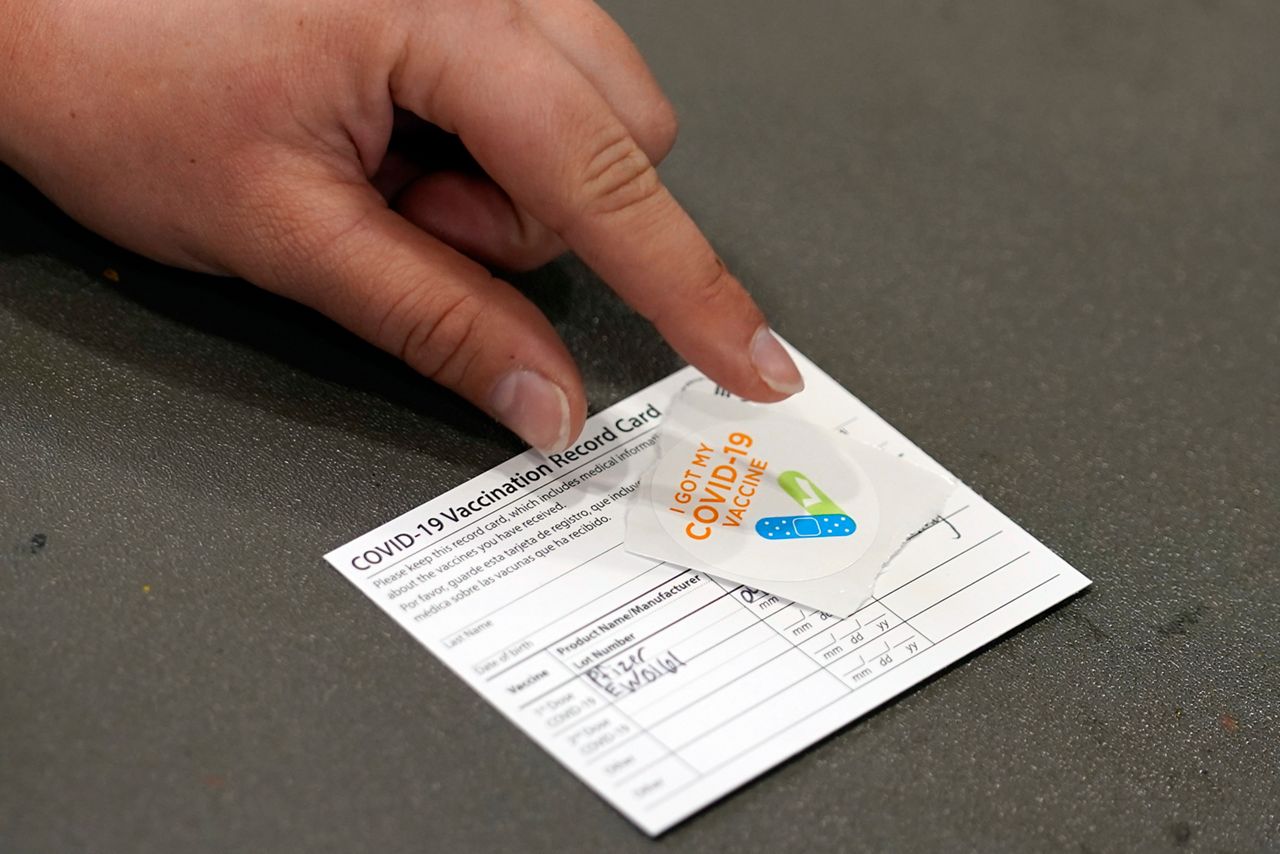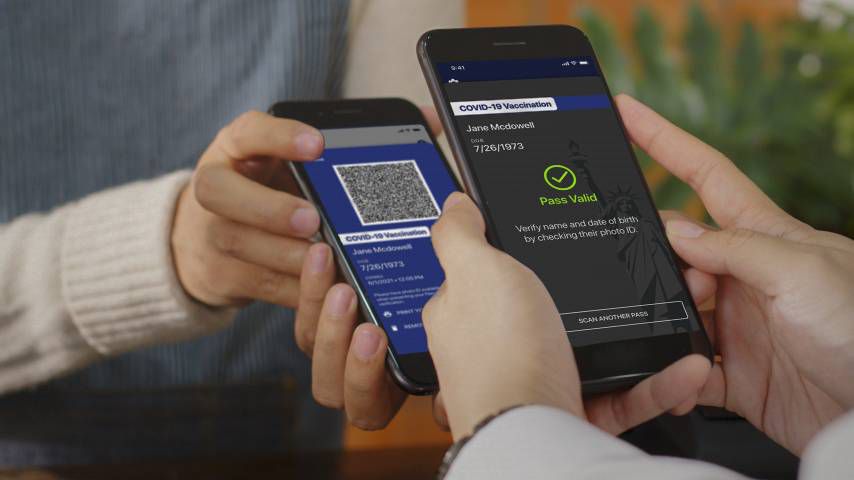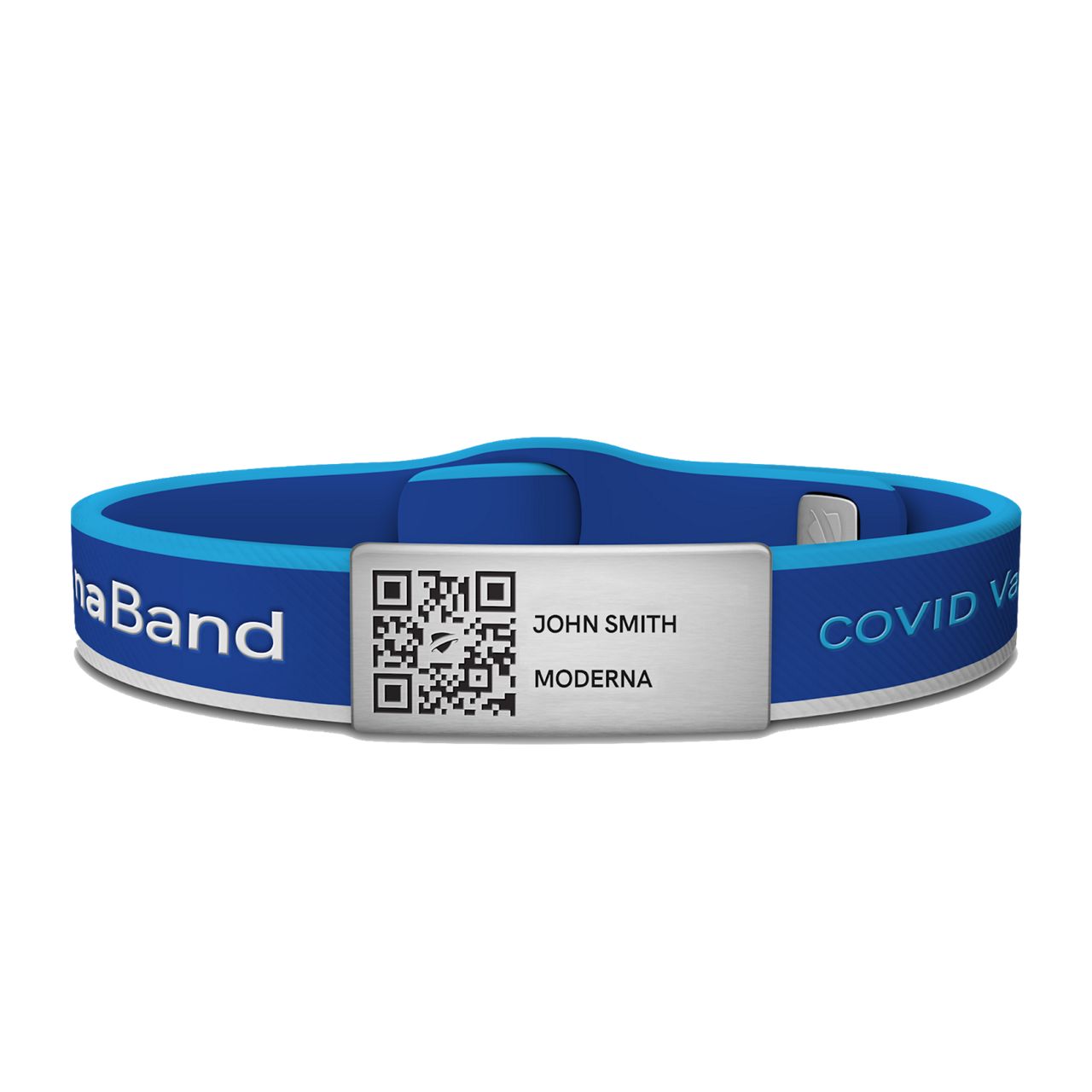After months of mask mandates, Americans received a welcome message from the Centers for Disease Control and Prevention in mid-May: Fully-vaccinated individuals can now forgo face coverings in most public and private settings.
As of Thursday, that guidance applies to 40% of the country, or around 132 million people.
Along with the relief, for many, came concerns — namely, how can those 132 million-plus individuals prove they are vaccinated against the virus? Can businesses, schools, and employers require proof of vaccination? And if so — should they?
The answers aren’t as straightforward as some might think: Federal officials maintain there will be no nationwide mandate or database to receive a COVID-19 vaccination, or to obtain proof thereof.
But state lawmakers are split on the issue of vaccine verification, and whether or not businesses should be allowed to mandate proof of a completed vaccine regimen.
Melissa Goldstein, associate professor at the George Washington University’s Milken Institute School of Public Health, told Spectrum News she “strongly supports” the government’s decision to leave mandates — or lack thereof — to the states, given the complex nature of the issue.
“I think that the federal government has taken a balanced issue here, and I support it because I think it depends on context,” Goldstein said. “This is one of the hardest issues that we face when we're talking about public health ethics, public health law — the interest of individuals, and how they can change per individual, and even within one individual in a different context, and the interest of society.”
Those who are unvaccinated “have different reasons, and we need to be aware of that, because they are part of our society as well,” she added.
First and foremost, health officials advise keeping your CDC vaccine card handy for proof, or at least a picture or photocopy of it.
No matter where you live, any business requiring proof of the shot should accept the government-issued card. Longer-term, it may be required for international travel in the coming months or for a vaccine booster shot down the line.
“My advice to folks is to just keep track of it the best that you can. Have a backup plan for it,” said Dr. Cameron Webb, a White House adviser on COVID-19. “Also have a picture of it just so you can keep track. And that's kind of the best guidance we have for now."

If you threw out or lost your vaccine card, check back with the provider where you got the shot, whether that’s CVS or a local pharmacy. Most should have a record of your inoculation.
For those who got vaccinated through FEMA or at another government-run site, "the CDC recommends that anyone who loses their vaccination card contact their state health department’s immunization information system, as their information should have been added to that registry," a FEMA spokesperson told Spectrum News.
Doctors have also recommended not laminating your vaccine card, since it may be used for future booster shots of the vaccine.
Some countries have opted for a government-approved vaccine passport, an official document, often digital, that proves someone is fully vaccinated against COVID-19. Israel has something called the Green Pass, for example, which can be presented digitally or printed, and Hungary is issuing immunity cards to its vaccinated citizens.
But U.S. officials have repeatedly affirmed that they will not create any kind of required credential or collect Americans’ vaccination data.
"Unlike other parts of the world, the government here is not viewing its role as the place to create a passport, nor a place to hold the data of citizens,” said Andy Slavitt, White House Senior Advisor for COVID-19, in a March briefing. “We view this as something that the private sector is doing and will do.”
The Biden administration has called for any sort of vaccine “passport” created by a U.S. company to be equally accessible to all, no matter what technology they have.
States largely fall into one of three camps when it comes to vaccine verification. There are those states, like New York and Hawaii, that have created statewide programs to help residents easily show they are vaccinated in venues that require them to do so.
In late March, New York rolled out the voluntary Excelsior Pass, which officials likened to a “mobile airline boarding pass, but for proving you received a COVID-19 vaccination or negative test.”
In order to use the pass, New Yorkers are asked to verify information including their zip code, name, birthday, date of their last COVID-19 shot, county of vaccination and which type of vaccine they received. They can then access a secure QR code either through a smartphone app, or by printing a paper version.
New Yorkers can use the app at participating locations, which include Madison Square Garden, Barclays Center and Times Union Center.

In early May, Hawaii’s Democratic Gov. David Ige launched a new phase for the state’s “Safe Travels” program, where Americans traveling to the island can upload proof of a negative COVID-19 test prior to arrival.
The recent update to the “Safe Travels” program allows fully-vaccinated Hawaiians to travel between islands and bypass and pre-travel testing or quarantine requirements
Other states, like Connecticut and California, say they will remain largely hands-off in the vaccine passport arena.
California will not create any one form of vaccine “passport” when it lifts its statewide mask mandate in June, officials confirmed last week. But residents will need some sort of proof of vaccination for the businesses that require it — and the state will also mandate that large indoor events, like sports games or concerts, check for proof of vaccination or a negative COVID-19 test.
A statewide vaccine verification program is similarly unlikely in Connecticut, where Gov. Ned Lamont, a Democrat, maintains that the private sector should lead the way.
“If I had businesses and others saying, ‘Boy it’d really be handy if the state came in and helped make sure some digital platform is in place,’ we’d take a look at it. I haven’t gotten that request though,” Lamont said last week, per the Connecticut Post. “I think most businesses are able to do it themselves.”
The third cohort of states is growing by the week; those that have banned businesses from requesting vaccine verification, both from employees and patrons, altogether.
The various statewide mandates against vaccine “passports” range in both scope and intent. But many lawmakers say their intent is to prevent discrimination against those who are unvaccinated.
In early May, Florida’s Gov. Ron DeSantis signed an order, effective July 1, that will stop businesses from requiring customers to show proof they have been vaccinated.
“In Florida, your personal choice regarding vaccinations will be protected and no business or government entity will be able to deny you services based on your decision,” DeSantis said at the time.
His action also barred state government agencies from issuing documents intended to prove a person’s vaccination status. The mandate doesn’t include health care facilities, but it does apply to schools and private businesses.
Similar legislation has been approved in Alabama, Arizona, Georgia, Idaho, Montana, South Carolina, South Dakota, Texas and more.
Of course, there are ways to signal vaccine status during interpersonal interactions — most locations giving out COVID-19 vaccines also offer a sticker or a pin to an individual upon completing their vaccine regimen.
And just last week, a slew of popular dating apps teamed up with the White House in a campaign to get more people vaccinated, with some offering users profile badges that show they got the shot.
Bumble, Match, OKCupid, BLK and Chispa, for example, have all created badges that say things like “Vaccinated” or “Vaxified” to let potential dates know they’ve gotten the shot.
Hinge and Tinder will give vaccinated members access to premium features of the app, plus other suggested ways to display their vaccination status on their profile.
But most currently-available ways to self-identify as vaccinated are limited to specific areas, meaning a person traveling outside of their home state might not be able to prove their status.
New York’s Excelsior Pass, for example, uses data from official New York city and state immunization databases, meaning the pass only works for those who received their jab in-state.
Even those entities residing within New York but not under the purview of the state’s regulatory authority — like Tribal Nations and federal operations — might be unable to get an Excelsior Pass, and instead must use a physical vaccine card or other approved form of vaccine verification.
There are growing options for individuals and businesses who wish to signal vaccination status to the public, although their use is subject to statewide mandates.
One of the first-to-market options is ImmunaBand, a high-tech bracelet whose QR code links to proof of an individual’s vaccination status.

“This is a way for employers to say, look, the people that aren't wearing masks aren't wearing masks, because they're fully vaccinated,” Dr. Tashof Bernton, creator and president of ImmunaBand LLC., told Spectrum News. “So it's both a symbol that you've completed the vaccination sequence, and it also is a visible representation of vaccination status.”
The wristbands can be used “really anywhere you need proof of vaccination status,” Bernton says. Not only is the data pincode protected, but the company has worked to ensure the bracelets are HIPAA-compliant and the information is “stored with the greatest security that we can.”
Still, protecting private health information remains a key concern for many Americans, and a number of companies are working to assuage those fears.
Since early January, the Vaccination Credential Initiative, a coalition of tech and medical experts, have been working to address those who may be concerned about sharing private information with a third-party app.
The goal of the 300-plus members is to create a universal implementation guide for “SMART Health Cards,” or a secure way for vaccinated people to add proof of their status directly to their smartphone. A final draft of the guide could be released by the end of May, and a working protocol is already live on GitHub.
Part of the effort’s short-term goals is to “enable a consumer to receive COVID-19 Vaccination or lab results and present these results to another party in a verifiable manner,” while accessing as little private medical information as possible.
The hope is that eventually SMART Health Cards could be shown to any location that requires proof of COVID-19 vaccination.
This article has been updated to include a statement from the Federal Emergency Management Agency.
